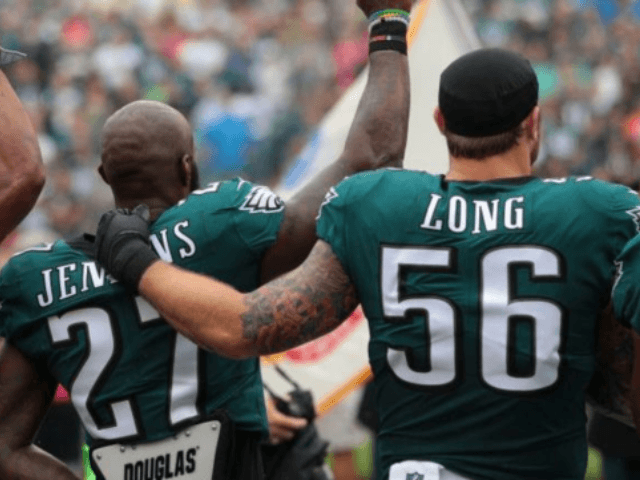Philadelphia Eagles defenders Chris Long and Malcolm Jenkins, have responded to President Trump’s request for a list of potential pardons.
The players — both of whom were prominent in the NFL anthem protests last year — used social media to lay out their case for criminal justice reform. Specifically, they urged the president to consider pardons for those serving life sentences for non-violent crime.
Jenkins wrote:
Mr. President, we should pardon those who have life without parole who have non-violent parole for non-violent offenses who have served a large portion of their time. Currently, over half of the men and women sentenced to die in federal prison are there because of non-violent crimes — 30 percent of which are there for non-violent drug offenses. And as of 2013, nearly two-thirds of those people were black. Our system is not rehabilitative. There needs to be a focus on helping people become better contributing citizens when they do return to society, as well as provide the opportunity to re-enter at a reasonable time for non-violent offenses.
Chris Long made the case for pardons pertaining to marijuana-related offenses.
Long said:
Mr. President, as of 2012, there were over 11,000 people sitting in federal prisons on marijuana-related offenses. It is now legal — recreationally and/or medicinally — in almost 30 states. There are people freely profiting off of it, as they should be. Yet still, there are thousands sitting in prison. Those people should be pardoned. There are also numerous cases of people sentenced to life without parole for non-violent drug crimes. They should not die in prison. And in most cases, people having served decades have done their time. They should go home.
In asking the players for a list of potential pardons, the president intended for a list of individual pardons. However, as stipulated in a New York Times article written by four NFL players, the players make the case that individual pardons do “not address the sort of systemic injustice that N.F.L. players have been protesting:”
But a handful of pardons will not address the sort of systemic injustice that N.F.L. players have been protesting. These are problems that our government has created, many of which occur at the local level. If President Trump thinks he can end these injustices if we deliver him a few names, he hasn’t been listening to us,” the story said. “As Americans, it is our constitutional right to question injustices when they occur, and we see them daily: police brutality, unnecessary incarceration, excessive criminal sentencing, residential segregation and educational inequality. The United States effectively uses prison to treat addiction, and you could argue it is also our largest mental-health provider. Law enforcement has a responsibility to serve its communities, yet this responsibility has too often not met basic standards of accountability.
The article continued, “These injustices are so widespread as to seem practically written into our nation’s DNA. We must challenge these norms, investigate the reasons for their pervasiveness and fight with all we have to change them. That is what we, as football players, are trying to do with our activism.”
The president’s pardon of drug dealer Alice Johnson, prompted the players to call for a more systemic cleansing of the criminal justice system.
“Imagine how many more Alice Johnsons the president could pardon if he treated the issue like the systemic problem it is, rather than asking professional football players for a few cases,” the players wrote.
However, given that the players decided to make a plea for a complete reform of the justice system — reforms which would result in the immediate release of tens of thousands of prisoners — as opposed to providing the president with a specific list of a few individuals. It’s quite likely that the opportunity the president extended to the players will result in the release of no prisoners whatsoever.
Just because someone is old and convicted of a non-violent offense, doesn’t mean they should be released from prison. Many high-volume drug dealers who imported tons of harmful narcotics and ruined the lives of thousands of people, never harmed a hair on anyone’s head. Do all of those prisoners deserve to get pardoned? Just because they’re older and didn’t assault, kidnap, or kill anyone?
Conversely, politics would enter such a decision as well.
Technically, as an 80-year-old and non-violent offender, Bernie Madoff would qualify for a pardon under the rules the players set forth. How many liberals who used Madoff’s crimes as a rallying cry for increasing government control of the financial markets, would sit still while he was allowed to go free?
Moreover, how much more of a powerful case and how much more goodwill could the players have generated for these reforms, had they simply met with the president at the White House?
Follow Dylan Gwinn on Twitter @themightygwinn

COMMENTS
Please let us know if you're having issues with commenting.